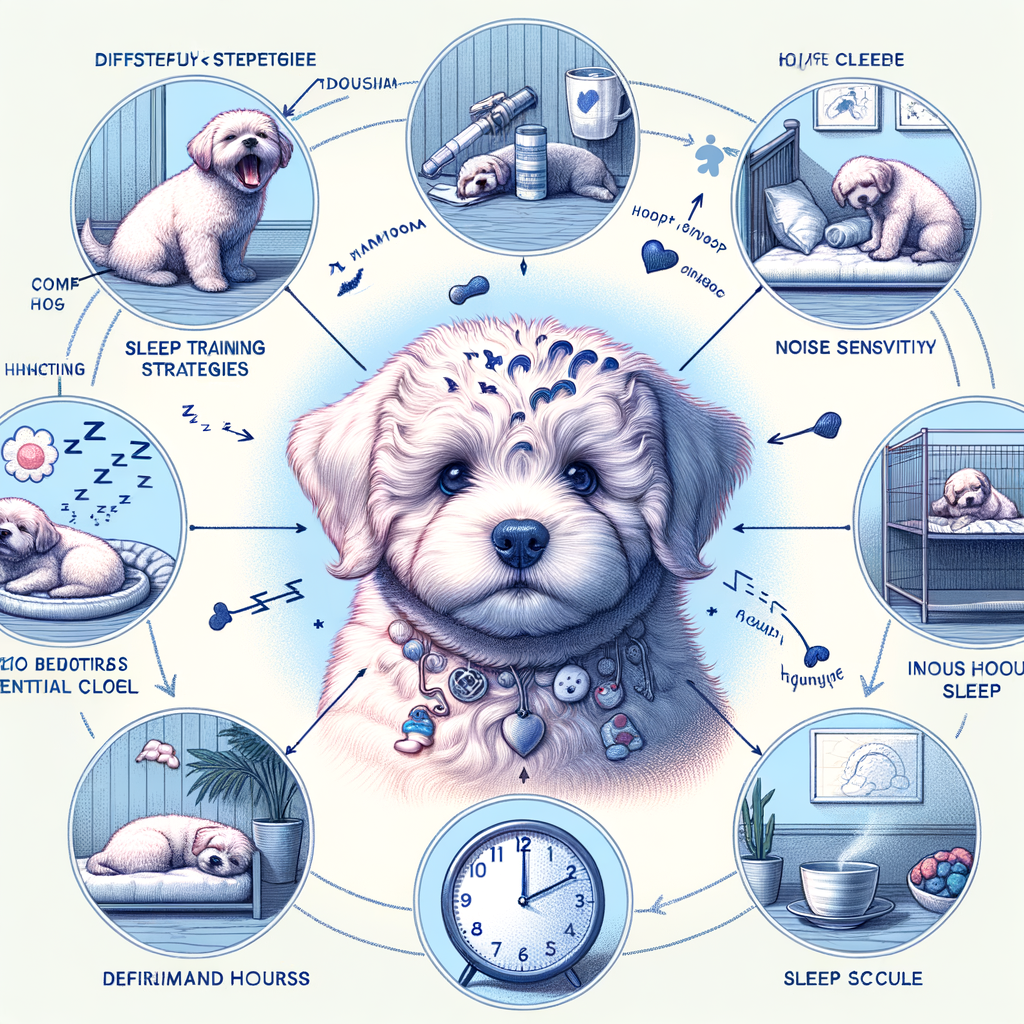
Understanding Maltipoo Sleep Patterns
If you’re a proud Maltipoo owner, understanding your furry friend’s sleep patterns can be incredibly beneficial. Not only does it help ensure they’re getting the rest they need, but it can also provide insights into their overall health and well-being. In this section, we will delve into normal Maltipoo sleep habits, factors that can affect these patterns, and how to monitor your Maltipoo’s sleep schedule.
- Normal Maltipoo Sleep Habits
- Factors Affecting Maltipoo Sleep Patterns
- How to Monitor Your Maltipoo’s Sleep Schedule
Just like humans, Maltipoos need a good amount of sleep to stay healthy and energetic. On average, a Maltipoo sleeps around 12 to 14 hours a day. Puppies and older dogs may sleep even more, up to 18 hours a day. It’s important to note that sleep duration can vary based on factors like age, activity level, and overall health.
Several factors can affect your Maltipoo’s sleep patterns. These include their diet, exercise routine, and overall health. For instance, a Maltipoo that doesn’t get enough exercise during the day may have trouble sleeping at night. Similarly, a diet high in sugar or caffeine can cause restlessness. Health issues, such as anxiety or discomfort from a medical condition, can also disrupt your Maltipoo’s sleep.
Keeping track of your Maltipoo’s sleep schedule can help you spot any changes that might indicate a problem. One way to do this is by keeping a sleep diary. Note down when your Maltipoo goes to sleep and wakes up, and any unusual behavior during sleep, such as restlessness or snoring. If you notice any significant changes in your Maltipoo’s sleep patterns, it’s a good idea to consult with a vet.
In conclusion, understanding your Maltipoo’s sleep patterns can help you ensure they’re getting the rest they need and stay healthy. Remember, a well-rested Maltipoo is a happy Maltipoo!
Common Maltipoo Sleep Issues
As a Maltipoo owner, it’s essential to understand that your furry friend may experience some sleep issues. These issues can affect their overall health and behavior. This section will help you identify common Maltipoo sleep problems.
Identifying Maltipoo Sleep Problems
Recognizing the signs of sleep problems in your Maltipoo is the first step towards helping them. Here are some common symptoms to watch out for:
- Excessive Sleepiness: Maltipoos are known for their energetic nature. If you notice that your Maltipoo is sleeping more than usual, it may be a sign of a sleep problem. Excessive sleepiness can be caused by various factors, including health conditions or lack of stimulation during the day.
- Difficulty Falling Asleep: If your Maltipoo is having trouble falling asleep, it could be due to several reasons. These can range from an uncomfortable sleeping environment to underlying health issues. It’s important to observe your Maltipoo’s behavior closely and consult a vet if the problem persists.
- Interrupted Sleep: A Maltipoo that frequently wakes up during the night may be experiencing sleep interruptions. This could be due to discomfort, noise, or even anxiety. Consistent interrupted sleep can lead to a tired and irritable Maltipoo, so it’s crucial to address this issue promptly.
Remember, every Maltipoo is unique, and what works for one may not work for another. It’s always best to consult with a professional if you’re unsure about your Maltipoo’s sleep patterns or if you notice any drastic changes.
Causes of Maltipoo Sleep Issues
There are several reasons why your Maltipoo may be experiencing sleep issues. It’s important to understand these causes so you can help your furry friend get the rest they need. Let’s delve into the three main causes: health conditions, environmental factors, and behavioral issues.
- Health Conditions
- Environmental Factors
- Behavioral Issues
Just like humans, dogs can also suffer from health conditions that affect their sleep. For instance, Maltipoos may experience sleep disturbances due to pain from dental issues or arthritis. Other health conditions that can cause sleep issues include heart disease, respiratory problems, and even obesity. Regular vet check-ups can help identify these issues early and provide appropriate treatment.
The environment in which your Maltipoo sleeps can greatly influence their sleep quality. Factors such as noise, light, temperature, and the comfort of their sleeping area can all impact their sleep. For example, a noisy environment can interrupt your Maltipoo’s sleep, while a too hot or too cold environment can make it difficult for them to fall asleep. Ensuring a comfortable and quiet sleeping environment can help improve your Maltipoo’s sleep.
Behavioral issues can also lead to sleep problems in Maltipoos. These can include separation anxiety, fear of the dark, or even boredom. If your Maltipoo is showing signs of anxiety or fear, it’s important to address these issues as they can lead to sleep disturbances. Similarly, a bored Maltipoo may have trouble falling asleep. Providing mental stimulation through toys and play can help alleviate boredom and improve sleep.
In conclusion, understanding the causes of your Maltipoo’s sleep issues is the first step towards helping them get a good night’s sleep. By addressing health conditions, creating a conducive sleep environment, and tackling behavioral issues, you can help your Maltipoo sleep better and live a healthier, happier life.
Effective Maltipoo Sleep Strategies
Training your Maltipoo to sleep effectively is crucial for their health and well-being. Let’s explore some proven techniques that can help your furry friend get the rest they need.
Maltipoo Sleep Training Techniques
Here are three key strategies to help your Maltipoo sleep better:
- Establishing a consistent sleep schedule
- Creating a comfortable sleep environment
- Using positive reinforcement
Like humans, Maltipoos thrive on routine. Try to set a consistent sleep schedule for your pet. This means having a fixed time for going to bed and waking up. This routine helps regulate your Maltipoo’s internal clock, making it easier for them to fall asleep and wake up at the right times.
A comfortable sleep environment is essential for a good night’s sleep. Make sure your Maltipoo’s sleeping area is quiet, dark, and at a comfortable temperature. A cozy bed and a favorite toy can also help your pet feel safe and relaxed.
Positive reinforcement is a powerful tool in sleep training. Reward your Maltipoo when they go to bed on time or sleep through the night. This can be a small treat, a belly rub, or some extra playtime. This will encourage them to repeat the behavior.
Remember, patience is key when it comes to sleep training. It might take some time for your Maltipoo to adjust to the new routine, but with consistency and positive reinforcement, they will eventually get there.
Addressing Maltipoo Night Behavior
When it comes to managing your Maltipoo’s night behavior, there are a few key areas to focus on. These include managing nighttime restlessness, dealing with nighttime barking, and handling nighttime potty issues. Let’s delve into each of these areas in detail.
- Managing Nighttime Restlessness
- Dealing with Nighttime Barking
- Handling Nighttime Potty Issues
Restlessness in Maltipoos during the night can be a sign of various issues, such as discomfort, anxiety, or a lack of exercise during the day. To manage this, ensure your Maltipoo gets plenty of physical activity during the day. A tired dog is more likely to sleep well at night. Also, make sure their sleeping area is comfortable and free from distractions.
Nighttime barking can be a nuisance and is often a sign that your Maltipoo is not getting enough sleep. This could be due to a variety of factors including anxiety, hunger, or needing to go to the bathroom. To address this, ensure your Maltipoo has a quiet, comfortable sleeping environment. It’s also important to establish a consistent nighttime routine, including a set bedtime and meal times.
It’s not uncommon for Maltipoos to have potty issues during the night. This could be due to a variety of factors, including a medical issue, anxiety, or simply not being able to hold it in for the entire night. To manage this, try taking your Maltipoo out for a potty break right before bedtime. If the issue persists, it may be worth consulting with a vet to rule out any potential health issues.
In conclusion, managing your Maltipoo’s night behavior involves understanding their needs and creating a conducive environment for them to sleep. Remember, a well-rested Maltipoo is a happy Maltipoo!
Keeping Your Maltipoo Awake During the Day
It’s essential to keep your Maltipoo active during the day to ensure a good night’s sleep. Here are some effective strategies to keep your furry friend awake and engaged:
- Engaging in Regular Playtime
- Providing Mental Stimulation
- Ensuring Adequate Physical Exercise
Playtime is crucial for your Maltipoo’s physical and mental health. Regular play sessions not only keep your pet awake but also help to build a strong bond between you two. Try to mix up the types of games you play to keep things interesting. For instance, you can play fetch one day and hide-and-seek the next. Remember, the goal is to keep your Maltipoo engaged and active.
Mental stimulation is just as important as physical activity. It keeps your Maltipoo’s mind sharp and helps prevent boredom, which can lead to excessive sleeping during the day. You can provide mental stimulation by teaching your pet new tricks, offering puzzle toys, or setting up an obstacle course in your backyard. These activities will challenge your Maltipoo’s mind, keeping them awake and engaged.
Maltipoos are energetic dogs that need regular physical exercise. A lack of exercise can lead to excessive daytime sleepiness. Ensure your Maltipoo gets at least 30 minutes to an hour of exercise each day. This can include walks, runs, or playtime in the backyard. Regular physical activity will help keep your Maltipoo awake during the day and ensure they sleep well at night.
Remember, every Maltipoo is unique, and what works for one might not work for another. It’s important to observe your pet and adjust these strategies as needed. With patience and consistency, you can help your Maltipoo stay awake during the day and sleep well at night.
Establishing a Nighttime Routine for Your Maltipoo
Creating a consistent nighttime routine for your Maltipoo can help them sleep better and feel more secure. Here are some steps you can take to establish a healthy sleep routine for your furry friend.
- Setting a Bedtime
- Creating a Bedtime Ritual
- Ensuring a Quiet and Dark Environment
- Signs Your Maltipoo’s Sleep Issues May Be Serious
- How a Vet Can Help With Maltipoo Sleep Problems
- Other Resources for Maltipoo Sleep Issues
Just like humans, dogs thrive on routine. Setting a consistent bedtime for your Maltipoo can help regulate their sleep patterns. Most dogs need about 12-14 hours of sleep per day, so plan accordingly. Try to stick to the same bedtime every night, even on weekends.
A bedtime ritual can signal to your Maltipoo that it’s time to sleep. This could include a final bathroom break, a calming activity like a gentle massage or brushing, and saying a specific phrase like “bedtime”. Over time, your Maltipoo will associate these actions with sleep.
Dogs, including Maltipoos, sleep best in a quiet, dark environment. Consider using blackout curtains or a white noise machine if needed. Make sure their sleeping area is comfortable and free of distractions.
If your Maltipoo is having persistent sleep problems, it could be a sign of a more serious issue. Symptoms to watch out for include excessive sleepiness, difficulty falling asleep, frequent waking, and unusual behaviors during sleep. If you notice any of these signs, it’s a good idea to consult a vet.
A vet can diagnose and treat sleep problems in your Maltipoo. They may recommend changes to your dog’s diet, exercise routine, or bedtime ritual. In some cases, medication may be necessary. Remember, it’s always best to consult a vet if you’re concerned about your Maltipoo’s sleep.
There are many resources available to help you understand and manage your Maltipoo’s sleep issues. Books, online forums, and pet sleep consultants can provide valuable advice and support. Remember, every dog is unique, so what works for one Maltipoo may not work for another.








